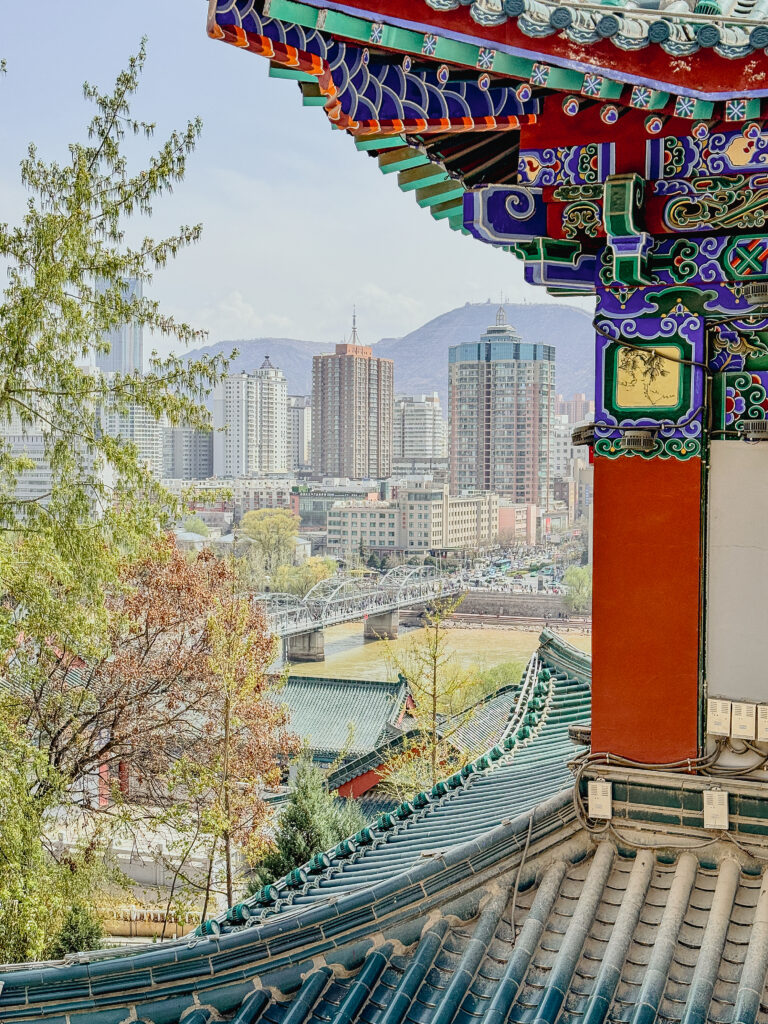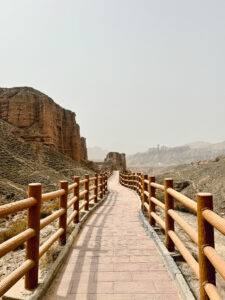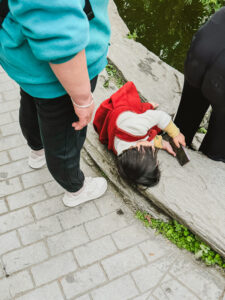
Here is everything you need to know before you head to China.
Finding information on how to navigate a country that doesn’t use Google by searching on Google may be a little fruitless, but I’m here to help. I’ve visited China a few times, most recently for almost two months in March-April of 2024 to travel across the Silk Road.
Australians will need a tourist visa to enter China for 30 or 60 days, which you can apply for via the consulate website here. Recently the governments announced a 15 day visa-free period for Australians. From 1 July 2024 to 31 December 2025 visa-free entry will be granted when arriving by sea, land or air.
In this guide, I’m going to cover all of the topics below. Feel free to click on subheadings and jump to the section you need.
Before you leave
There are three things you MUST do before leaving Australia (aside from the usual packing a passport and holding a valid visa). They are:
- Subscribe to a VPN service
- Buy an e-sim
- Set up Alipay and WeChat
Getting a VPN for China
Make sure you take out a VPN service before you leave China. If you don’t, you’ll likely arrive and not be able to access any of the websites you’re used to. That’s because of the ‘great firewall of China’ which blocks a lot of common social media platforms. Google is also blocked in China so you’ll have to use Bing search and avoid the Chrome browser (though it does sometimes work if you visit Bing on Chrome).
In 2024 the firewall was working harder than any other time I’ve visited in the past. Previously I used ExpressVPN and never had trouble, but this visit it was extremly temperamental and only worked about 40% of the time. Nord VPN also didn’t work for me at the time.
In my experience Astrill is the best option and worked 99% of the time. It is more expensive at $30USD per month, but the extra cost is really worth it to guarantee access. That said, I am chronically online and for a living.
Using an e-sim in China
Another way to gain unrestricted internet access in China is with an e-sim. These can be bought and downloaded easily before you take off. I recommend buying one before departure, then activating it when you land using the airport wifi.
There are a lot of providers to choose from but I’ve had the most success with Airalo (more expensive, reliable), Maya (cheaper, less reliable), and Mobimatter (cheaper, reliable).
One thing to note is that if you use an e-sim you won’t need to use a VPN on your phone. That’s because the e-sims have a location registered to them outside of China (despite you being on a network within China). Usually within Asia.
A word of warning. If your e-sim provider routes through Hong Kong you may have trouble using TikTok as the platform is currently not operating there. Everybody needs a little afternoon phone time to recharge and it's ok to want TikTok there with you.
I actually had a panic moment thinking TikTok removed my account. I struggled to find any help on forums, but after a few weeks of googling and stressing, eventually figured out it was the Hong Kong e-sim connection.
If you get stuck without TikTok using an e-sim in China I found a way to solve it.
Open mobile settings, select the e-sim you're using then navigate to "network selection". Turn OFF the automatic network selection then choose a different provider. Close the TikTok app and re-open it to see if it loads.
I could only use the China Mobile network in mainland China and have TikTok and all other apps working normally.
Regardless of whether you’re chronically online or not, China is. So, you’re going to need access to the internet on your phone to do almost anything from ordering a taxi to buying train tickets. That’s becuase you NEED to use AliPay or WeChat.
If you don’t speak any Chinese and want to visit anywhere except international hotel chains in big cities you need access to translation apps like Google Translate, DeepL, or ChatGPT. Trust me on the e-sim.
How to pay for anything in China (Alipay & WeChat)
In 2024 China is mostly cashless. That said, don’t forget to withdraw cash on arrival at the airport to pay for your first taxi ride into town. Foreigners can set up AliPay accounts but often can’t directly transfer to Chinese locals on the app (only businesses). Don’t be like me and end up frantically running around a shopping mall in Changsha for 20 minutes trying to find an ATM when your AliPay subsequently fails.
So, your must-do’s before departure:
- Download and set up the AliPay for foreigners app. You will need to submit ID documents, verify your identity then link a card to use the payment feature. You’ll use this app to pay for most things and order DiDi’s (Chinese Uber).
- Download and set up a WeChat account, then add WeChat pay. You will also need WeChat to communicate with hotel staff and book any tours.
- On the payment front, make sure your foreign mobile can receive text messages for verification purposes on payments and local apps. A few times I was asked to verify purchases from my bank when making larger payments on the AliPay app. Most phones can receive messages abroad as long as the mobile plan is active, you don’t need a roaming pack. Both mine and my partners did despite being told they wouldn’t. Just make sure to keep your local sim turned on.

Zhangjiajie National Park, Hunan province
When you arrive
When you land in China, there are a few apps you want to get familiar with that will make your trip much easier. These are:
- Gaode/Amap/Apple Maps
- DiDi via Alipay
Navigating using a maps app
First thing’s first, Google maps SUCKS in China. You’ll be in the wrong place all the time, and many of the places just won’t appear, it’s a nightmare to use. Even if it looks like it’s operational in some cities, the information is very limited and often incorrect.
Apple Maps abides by all of China’s data and security laws, so Apple is able to operate freely. Therefore, for the first time ever Apple Maps is actually the better option.
If you want to go pro-level, the local Chinese app Gaode (also called Amap) is the best option. It’s all in mandarin, but once you learn which buttons to press, finding restaurants, public transport routes, and walking directions are much easier.
How to decide?
- Apple Maps is the best option if you’re on a short trip and don’t want the hassle of navigating a language barrier.
- Gaode is my personal preference with lots of functionality, find it in the app store under 高德地图.
- Just learn some of the buttons and translate screenshots when you need. It’s great for food options as you can see photos of the places. If someone gives you a recommendation in Chinese characters you can paste the name in and find the restaurant then add a star to keep it visible on your map. Just ignore the pop-ups asking for a Chinese phone number, you don’t need it to star places.
- Baidu is the other major map app, but I prefer Amap because it’s what I’m used to so that’s all I can comment on.
- Android users won’t be able to access Apple Maps so your best option is to learn some of the Gaode map functions.
Riding public transport and ordering taxis
You can use the map apps above to navigate to places and find public transport routes. China has a world-class train system and you can get almost anywhere in the major cities by train. I can’t write in Mandarin, so we just pasted the address from booking apps or translated characters into Gaode maps to navigate to sites and restaurants.
All the big cities are REALLY well signed in English so getting around the subway is easy. You’ll just need to buy a ticket at the machine each time which will be used for a single ride. Plenty of locals will use transit cards but you need a Chinese phone number for these.
For taking taxi’s, using the DiDi app through AliPay is the best way to go somewhere and not get ripped off. It’s just the same as Uber and in the Alipay app everything is in english. You also don’t have to fart around with payments or trying to translate an address for a taxi driver.
I’ve now had two extremely stressful taxi rides from airports where the driver didn’t know where to take me despite having the address translated and I had no cash at the time (my own stupidity), so this is a great way to avoid that.

Hairy tofu on display in Ciqikou Old Street, Chongqing
Booking tickets, accom & tours in China
Once you’re in mainland China, good luck googling for tours and tickets. Only one of the major booking platforms operates in China but luckily they do an excellent job of it.
One app to rule them all
I can’t stress enough that you need to book everything through Trip.com if you’re not taking a fully-catered tour.
I’m one of those people who likes to book everything myself, avoids third-parties and never goes to a travel agent, BUT I had to get over it or we wouldn’t be going anywhere.
Trip gives you access to Chinese airlines, hotels and trains that sometimes are only available to native speakers. They handle any extra admin for you and offer great flexibility and prices. You can cancel train tickets and re-book with short notice and if there are any issues like cancellations they will inform you in English and re-book on your behalf. To pick up tickets you often just need to show your passport as everything will be issued under your passport number. They offer free customer service calls any time within the Trip app and have always been really helpful and friendly.
The only other way to access train tickets in China as an English speaker is by going to the station and buying a ticket at the window on the day. You can do this, but it takes a lot longer as there are often queues and there’s no guarantee there will be seats available.
Advice for travelers/families/longer stays: Trip only shows hotels and hostels on the app, so booking something like an apartment with a kitchen and laundry can be challenging. There are some listed in Trip.com but the selection is low and they're often further out of town. There's no real solution to this as China doesn't have an Airbnb equivalent available to foreigners, but you'll want to look for accommodation listed as "homestays" as they're often not staying in someone's home with them, but more staying in a home-like accommodation.
Don’t forget your passport!
Last but not least, you will need your ID.
China is very big on ID, much like having a social security number in the US, citizens use a Chinese ID card to book and access a lot of things. For foreigners, you will need to use your passport for all your train travel and hotel check-ins. You might be surprised to find that you’ll also need to show your passport to access most popular tourist sites and national parks (especially any with political ties like Orange Island in Changsha), so get used to carrying it around with you.

Lanzhou’s downtown area and Zhongshan bridge from across the Yellow River
General tips and cultural advice
Some quick tips on things to expect and general advice for being in China.
- China is very convenient, you won’t need many extras. Things I regret bringing include: a hairdryer, crocs, and a puffer jacket instead of buying one on arrival (better, cheaper).
- Hostels are really nice with cheap and spacious rooms, and because there’s not the same type of party culture they’re often very relaxed and quiet. Strangely not many of the hostels we stayed in had kitchens but with food so abundant and cheap it’s not much of an issue.
- Accessing pharmaceuticals is easy with translations, and pharmacies near international hospitals are best.
- Learn some of the language (just basic, hello, thank you, can I have this etc.) – you will need it and let’s face it, it’s rude not to.
- Cultural differences in etiquette are something that you should accept before visiting. There are many things Australians do that would shock Chinese people, like swearing infront of your parents, or wearing shoes inside the house, and vice versa. Be ready to see some things you might not be familiar with, but understand it’s coming from a good place.
Quick-fire round of some of the biggest cultural differences:
- A perceived lack of politeness. In Chinese languages there is less “padding” and the sentences are simple and direct. It may feel rude to us, but it’s just a disconnect.
- People in China (often older) spit in public. It’s due to a belief that if you have something bad inside if you it’s healthy to expel it. This is changing with the new generations but it still happens.
- Vaping is illegal in China and a lot of Chinese people still smoke. Sometimes inside. Make sure to look for non-smoking hotel rooms when booking.
- Foods may be confronting for a Westerner. Just remember that people don’t eat foods because they taste bad. For someone else that item is a beloved treat and has a meaningful connection to their culture, so it’s best not to be rude about it.
- People stare a lot, out of curiosity, and may approach you for a photo or to connect on WeChat. They are just curious and want to know more about you so you if you don’t like the attention just politely decline.
- Oh, and I hope you’re ready to use a squat toilet.
If you’ve made it this far, I’ll leave you with a final tip. One thing you’ll need to carry in China is a packet of tissues, and they’re not for tears. Public bathrooms seldom offer toilet paper so make sure you’ve got a packet on you at all times to avoid any awkward situations. You can find them on basically every street corner at convenience stores and supermarkets. They also do mini wet wipes which are handy to have with all the street food around. Oh, and don’t flush the tissues, just put them in the bin provided.














[…] The ultimate guide to visiting China […]
[…] The ultimate guide to visiting China […]
Camellia, thank you very much for your information. I think china is a place I would love to see and experience. all the best to you
Merry Christmas
Jason
Hope you get to experience its beauty someday!